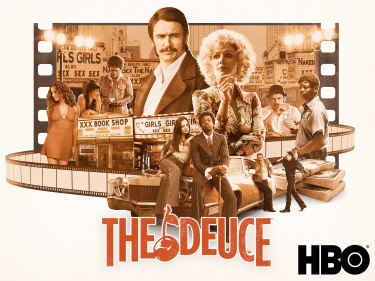The Wire is still widely cited by many as the greatest television show that has ever been made. Creator David Simon has made other shows since then but none stood out to me particularly. The Deuce however brings serious star power with James Franco and Maggie Gyllenhaal as leads and co-producers. Instead of drugs, the focus of the series is on the sex trade in New York City during the 1970s. We’ve only seen the first season and it’s as great and richly complex as you might expect. It does however feel more like an ethnography than a dramatic story and it unfortunately lacks the magical spark that made The Wire so special.
The Deuce is a nickname for a particular stretch of the city which has turned into a red-light district and this series is about the many people who inhabit it. They include Vincent Martino, a bartender who is having trouble with his wayward wife. In solving the debt problems with his gambler twin brother Frankie, he gets to know Rudy Pipilo, a Mafia boss who subsequently sets him up with his own bar. There’s also Candy, the street name of the rare prostitute on the street who isn’t working under a pimp; Chris Alston, a local black police patrolman; a Abby Parker, a white girl from an affluent family who drops out of college to embrace life on the Deuce, plus many street prostitutes and their pimps. Each character has their own story arc but the season as a whole is really about how the commercial sex scene in the area works, implicitly allowed by corrupt police officers. It traces the development of a legal pornography industry as well as the gradual move from street prostitution to indoor brothels engineered by the Mafia and backed by unknown city authorities.
The cast of characters is huge and James Franco even plays two different characters. I get a little confused at times which prostitute is under which pimp but as each storyline is generally quite straightforward, it’s not hard to keep track of everything. It’s pretty satisfying to see this run-down, crime-ridden version of New York before it was gentrified and turned tourist-friendly as it exists today and of course the profusion of sex scenes and nudity gives it a salacious appeal. Naturally it also works as a solid primer on the economics of the trade, explains why the prostitutes need to work under pimps, and gives audiences an idea of what pornography was like before the Internet. I feel that James Franco overacts when he is performing opposite himself as the two twin brothers, but thankfully Frankie is only a minor character here. Everyone else is great, with the pimp C.C who is slickly dressed and outwardly charming but actually among the cruelest of them all, being the most standout character.
The downside of this being almost a kind of documentary is that the characters feel as if they’re each there to represent a specific type and so each have predictable arcs. When a girl is brutalized for example, you know that it’s to show the audience how dangerous their work on the street can be. When Abby tries to save a girl from the streets, it’s really an object lesson that many of the prostitutes actually do choose this kind of life for themselves. It works but it’s neither terribly surprising nor dramatic as we already know in advance how things will play out. About the only piece of character development I find personally intriguing is Abby trying ever so subtly to teach Vincent feminism. Furthermore with the series having to juggle between so many characters, we’re actually only engaging with each of them very shallowly, so our emotional engagement with them is similarly shallow.
We will go on to watch the remaining two seasons as it is both that good and it feels vaguely educational. Based on Simon’s previous track record, it should also be fascinating how the fates of the people on the street are decided by those high up in the hierarchy of political power, as yet unseen in this season. But it’s also clear that this is no second coming of The Wire as none of the scenes and none of the characters have the stand out quality that made it instantly acknowledged as a classic.

One thought on “The Deuce”